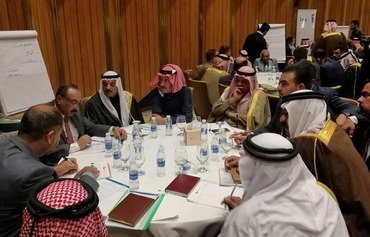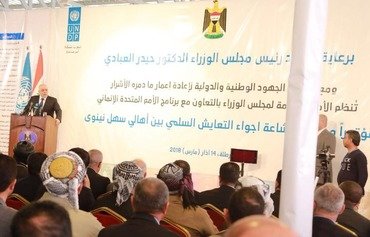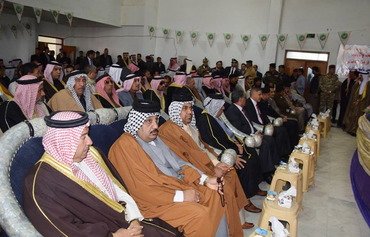A reconciliation programme sponsored by the UN in Iraq has made it possible for hundreds of Iraqi families whose sons had joined the "Islamic State of Iraq and Syria" (ISIS) to return to their homes in Ninawa province.
The "Covenant of Honour", signed October 14th, aims to encourage more than 1,100 families perceived to be affiliated with ISIS to return to their places of origin in the Muhalabiya sub-district, a statement by the UN Assistant Mission for Iraq (UNAMI) said.
The signing took place during a "Local Peace" conference, organised by the West Mosul Local Peace Committee and sponsored by the governor of Ninawa. It was supported by the UNDP in Iraq.
Attendees included Muhalabiya community members, government figures, sheikhs, community leaders and family members of returnees.
![An agreement was signed on October 14th to allow more than 1,100 families whose sons were involved with ISIS to return to their places of origin in the Muhalabiya sub-district of Ninawa province. [Photo courtesy of the Ministry of Migration and Displacement]](/cnmi_di/images/2020/10/30/26715-iraqis-isis-families-600_384.jpg)
An agreement was signed on October 14th to allow more than 1,100 families whose sons were involved with ISIS to return to their places of origin in the Muhalabiya sub-district of Ninawa province. [Photo courtesy of the Ministry of Migration and Displacement]
For many families, the covenant signing will mark their return home for the first time in three years, when liberation operations in the area began, according to the UNAMI statement.
During the years of conflict with ISIS, more than six million Iraqis were displaced from their areas of origin. An estimated 1.4 million individuals remain displaced, including close to 330,000 persons in Ninawa province alone.
Community cohesion
For individuals perceived as affiliated with ISIS, hardships often include threat of exploitation and violence during displacement.
"The dedication of the Local Peace Committees to reintegrate people who have been displaced from their communities is vital to ensure a strong and cohesive future for the people of Iraq," UNDP-Iraq Resident Representative Zena Ali Ahmad said.
"This conference and the resulting covenant are a milestone for Muhalabiya and a promising indication of community peace and stability moving forward," she added.
Mosul mayor Zuhair al-Araji, who attended the conference as a representative of the local government in Ninawa, said the returnees included families who have disavowed their ISIS sons.
It has been proven that these families "were not involved in crimes committed by the terrorist group", he told Diyaruna.
He said the local government's position with regard to ISIS elements remains constant: "There is no compromise with those involved in the shedding of Iraqi blood and those who committed the crimes of murder, bombing and kidnapping."
The reconciliation was reached with relatives of ISIS elements who have distanced themselves from the group and rejected and disavowed its crimes, al-Araji stressed.
Ninawa Police Chief Brig. Laith Khalil al-Hamdani said the reconciliation project was implemented within the framework of Iraqi law and under the principle that no person is to be faulted for the crimes of another.
"The authorities and security services in the province know very well who the [ISIS elements] are, have a comprehensive database about them and are eager to capture them and bring them to justice," he told Diyaruna.
Challenges facing returnees
Sheikh Faiz al-Luweizi, a tribal sheikh in Ninawa province, said the return of the families to Muhalabiya came as a result of the strenuous efforts of notables and clerics under the government's supervision to bring peace and reconciliation to western Ninawa regions.
The return of IDPs to the district is not without many challenges, he told Diyaruna, including economic hardships and the challenge of reintegrating into the local community.
The government must improve economic conditions and secure job opportunities for the returning families, and provide them with financial support to help them rebuild their destroyed homes, he said.
Reconciliation in Muhalabiya is part of a broader UNDP plan that aims to reach 4,000 families in Ninawa, Salaheddine and Anbar provinces in the first year, to be followed by more households in 2021 and 2022.

![Hundreds of Iraqi IDPs return to their areas of residence in the provinces of Ninawa, Salaheddine and Kirkuk. [Photo courtesy of the Ministry of Migration and Displacement]](/cnmi_di/images/2020/10/30/26713-Iraq-displaced-families-600_384.jpg)






